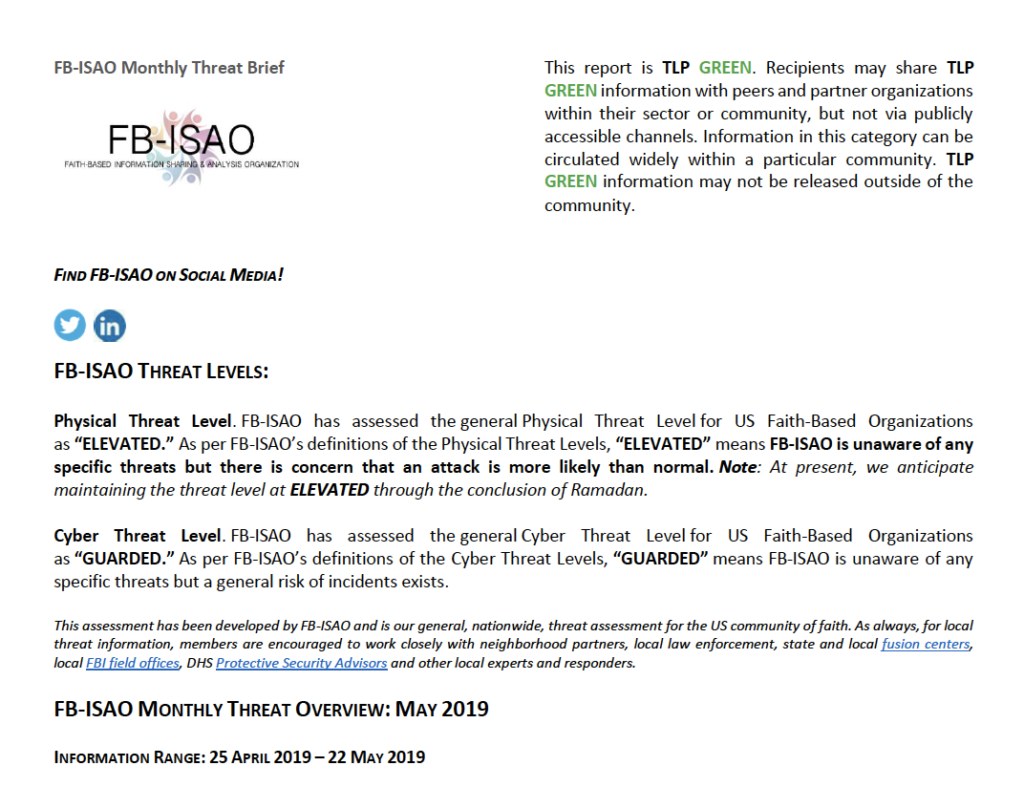by Andy Jabbour, Managing Director, FB-ISAO
Every month, FB-ISAO provides a TLP GREEN report, the FB-ISAO Monthly Threat Overview. The report is developed over a specific reporting period by a team of analysts. The report addresses all-hazards – to include physical, cyber, natural hazards, and health threats. Reviewing the draft of the most recent report, finalized and distributed on 24 May and covering the period from 25 April – 22 May 2019, I was amazed by the remarkable number of incidents that were included.
Addressing the area of hostile events, the report notes, “The persistence of domestic arrests, incidents, and continued jihadist and other extremist rhetoric remains a direct threat to the Faith-Based Organizations (FBOs). We continue to consider the threat of lone actor or a small group of extremists to be a credible threat. Over the past month, there were several events and arrests that continue to serve as reminders of the continuous physical security threats facing the sector.”
“Our right to worship freely and without fear is fundamental to life in America.”
Renn Cannon, Special Agent in Charge of the FBI in Oregon
The complete physical security section includes incidents involving vandalism, theft, harassment, arrests and other notable events. But it was the section covering Active Shooter & Hostile Events that jumped out at me. An excerpt from that section follows. I encourage you to review the list of incidents and let that sit with you for a few moments.

Is your organization properly, reasonably, and responsibly addressing the risks you are facing? Are you actively working on preparedness and operations to protect and prepare your people and places?
FB-ISAO will be providing our second offering of the Hostile Events Preparedness Series educational presentation on 20 June. It is free, and only costs you an hour and a half of your time. Contact our team for more information on that event. Consider joining FB-ISAO, tying in to our growing community of security-focused faith leaders and help enhance the security and resilience of your FBO and our collective community of faith. As recently stated by Renn Cannon, Special Agent in Charge of the FBI in Oregon, “Our right to worship freely and without fear is fundamental to life in America.” Are you doing everything you can to help protect and prepare your people and places so all Americans, and those within our boarders, are able to “worship freely and without fear?”

The complete FB-ISAO Monthly Threat Overview goes into additional incidents, other threat vectors and provides resources for members. As a TLP GREEN report, it is available to all Standard and Professional members, as well as our Government and Law Enforcement members (read more on membership here).
Active Shooter & Hostile Events, for period from 25 April – 22 May 2019.
- Over the weekend of 18 to 19 May in Chicago, Illinois, separate incidents of attempted arson and vandalism occurred at local synagogues. Worshipers who arrived at one synagogue Sunday morning discovered broken glass and charred black rags outside the building. Police later confirmed that an unknown assailant twice attempted to set the building on fire around midnight on Saturday. No one was injured and there was no damage to the synagogue. Police were also investigating vandalism outside several synagogues in the city’s West Rogers Park neighborhood, where the windows of cars parked outside the building were smashed early Sunday morning.
- On 15 May in Kalamazoo, Michigan, a fire destroyed a church. It took two dozen firefighters over four hours to douse the fire. The building is a total loss, and a home next door suffered exterior damage from the intense heat. The fire marshal didn’t yet know what sparked the fire; federal agents joined the investigation.
- On 12 May in New Haven, Connecticut, a fire broke out at a mosque that is still under construction. Officials said they believe the fire was intentionally set. The fire started on the first floor of the building and spread to the second level.
- On 12 May in Dablo, Burkina Faso, gunmen killed six people, including a priest, as Mass was being celebrated in a church. The attackers, said to number between 20 and 30, then burned down the church. The town’s mayor said there was panic as other buildings were burned down and a health center looted. As noted below, a Protestant church was attacked in Burkina Faso on 28 April, resulting in the deaths of a pastor and five congregants. Islamist groups have been blamed for a number of attacks in the West African nation in recent years.
- On 11 May in Arlington, Massachusetts, a fire was set outside the home of a rabbi that serves at a Jewish center. The incident is being investigated as a hate crime. Police asked for the public’s help in identifying a person caught on a neighbor’s video camera walking away from the home around the time of the fire. Firefighters put out the small fire that burned the shingles of one side of the building. Police and town officials have no evidence yet that the location or its Jewish homeowners were targeted because of their religion, but “are leaving open and actively investigating the possibility of a hate crime.” On 16 May, another fire was set at the Jewish center. The fire, which was on the home’s exterior wood shingles, was small, and firefighters were able to put it out using a hand-held extinguisher.
- On 10 May in Couva, Trinidad, a 57-year-old businessman was killed inside a mosque, although the country’s attorney general said the incident should not be labelled as an act of terrorism nor a hate crime. eyewitnesses said the businessman was mingling with fellow Muslims outside the mosque when he was approached by a gunman. He then ran up a flight of stairs and into a prayer room, where he was killed.
- On 9 May in Charlottesville, Virginia, a hit and run occurred near a mosque. Police said a dark colored Sedan struck a man’s arm while he was walking along the street. Another member of the mosque claims a car with the same description swerved at her while she was walking to the mosque earlier the same week but at the time, she did not think anything of it. The mosque had been bolstering its security measures in previous months.
- On 9 May in London, England, a man fired a shot outside a mosque during evening prayers for Ramadan. The man was reported to have entered the mosque but was “ushered out” by those inside, police said. A shot was heard shortly after. Police said there were no injuries and they were not treating it as a terrorist incident. They said they believed the shot came from a blank-firing handgun. One theory police are considering is that the gunshot followed a dispute linked to gangs or criminality which started in the street and then moved into the mosque.
- On 6 May in Brooklyn, New York, a Hasidic Jewish man was assaulted in an unprovoked attacked. Without saying a word, one of the men walked up to the victim and punched him in the face. Another suspect yelled anti-Semitic slurs at the man. The group fled the area. The man was not seriously injured.
- On 6 May, French police arrested a 16 year old in Strasbourg, France for actions in conjunction with a plot to attack security forces and possibly Elysees Palace. This arrest is in connection to the arrests in April of three adults and one teenager who had allegedly planned an attack “to coincide with the start of the Muslim holy month of Ramadan… with officials saying the suspects had scouted out areas near the Elysee and a police station in the Parisian suburb of Aulnay-sous-Bois.” French authorities believe this individual published a video pledging allegiance to the Islamic State.
- On 28 April in Cincinnati, Ohio, a family of four Sikhs were shot and killed inside their apartment complex. Locals in neighboring apartments said they heard a barrage of gunfire, which forced them to rush out on the streets. However, the alleged killer had fled from the spot. Local police launched a probe into the attack, which is as of now being suspected as an act of “hate crime.”
- On 28 April in Burkina Faso, unidentified gunmen killed a pastor and five congregants at a Protestant church, the first attack on a church in a country that has seen an upsurge of Islamist violence this year. Burkina Faso, which boasts of a history of religious tolerance, has been beset by a rise in attacks as groups based in neighboring Mali seek to extend their influence over the Sahel, the arid scrubland south of the Sahara. The government declared a state of emergency in several northern provinces bordering Mali in December because of deadly Islamist attacks, including in Soum, the region where Sunday’s attack took place.
- On 27 April near San Diego, California, a shooter who appears to have posted an open letter riddled with anti-Semitism and racial epithets opened fire at a San Diego County synagogue on the last day of Passover. Police said the man opened fire with a rifle, killing one woman and wounding a girl and two men, including a rabbi. Police said the shooter left after his rifle possibly jammed and was fired upon as he fled by an off-duty Border Patrol agent working as a synagogue security guard; the agent struck the getaway car but did not wound the man. A San Diego police officer en route to the synagogue heard details on the radio and confronted the suspect where he had pulled over along the road near Interstate 15. Officials said he surrendered without incident and a rifle was discovered on the front seat.
- On 26 April in Los Angeles, California, a man deliberately drove a vehicle into a crowd of people, doing so because he thought they were Muslim, police said. Eight people were injured in the incident, including three members of the same family. A lawyer for the man said the incident “was clearly the result of a mental disorder”, and he would seek psychiatric treatment for his client, who he described as a military veteran possibly suffering from PTSD.
- On 25 and 23 April in Bethlehem, Pennsylvania, fires were set at a church. The first fire built a thick, black smoke cloud around the building, but had burned out by the time authorities arrived. It was ruled arson by the Bethlehem city fire marshal. The motive was unclear, according to a statement from the Bethlehem police, but the fire appeared to have been started in the sanctuary area of the church. Then, just two days later, firefighters were at the church again, extinguishing a blaze which was contained to the roof of the structure, right above the sanctuary area. By 26 April, police had arrested a man in connection with the fires, charging him with arson, burglary, and criminal trespass.
- On 23 April in Austin, Texas, a man attempted to commit arson at a mosque. He was captured on security video just after midnight pouring what appears to be gasoline on the side of the building and then attempting to light the fluid. The mosque was the target of repeated vandalism last fall. It hired an armed security guard after tires were slashed and the building’s front doors and windows were shattered in September.
- On 22 April in Sri Lanka, a van parked near a church that was bombed on Easter Sunday exploded; no injuries have been reported. Police went to inspect the van Monday after people reported it had been parked near St. Anthony’s Shrine since Sunday. They discovered three bombs that they tried to defuse. Instead, the bombs detonated, sending pedestrians fleeing in panic.
- On 7 May, it was reported that there have been increasingly violent clashes in Negombo, the site of St. Sebastian’s Church (one of the three churches that was bombed on Easter), with mostly-Catholic mobs attacking and vandalizing Muslim-owned shops, homes, and vehicles. Negombo suffered the highest death toll in the Easter Sunday attacks. The bomb at St. Sebastian’s killed more than 100 worshippers. The violent attacks prompted Sri Lanka’s Roman Catholic Church to call for the hostility against Muslims to end.
- On 2 May, Sri Lanka’s Catholic Church said it would not resume Sunday services as planned on May 5 after the government warned of more possible attacks by an Islamic State-linked group. It was the second week following the attacks in which the Catholic diocese canceled services. Instead of public services the first Sunday after the attacks, the cardinal delivered a homily at his residence that was broadcast live on television.
- On 12 May, Sri Lanka’s Catholic Church held the first regular Sunday Mass since the attacks. Military forces and police armed with assault rifles patrolled the streets leading to churches and stood guard outside the compounds. Everyone entering was required to produce identity cards and be body searched. Volunteers were stationed at the gates of churches to identify parishioners and look out for any suspicious individuals. Parking was banned near the churches and officials urged worshippers to bring only minimum baggage.
- On 29 April, Sri Lanka announced a ban on Muslim women wearing face veils. Although the niqab and the burka, which are worn by Muslim women, were not specifically named in the ban, any face garment which “hinders identification” is no longer permitted to ensure national security, the president’s office said.
- On 23 April, the Islamic State claimed credit for the bombings. Independent media groups that produce posters and videos supporting the Islamic State have used the attack to push for more jihadist operations. One poster depicts a jihadist with dark blond hair in military fatigues entering a bombed-out church: “O worshippers of the Cross you will not enjoy your living, you have opened up the gats of hell to yourselves by waring [sp] us, so wait for what will embitter your life, and what is coming is more bitter and more disastrous.”
- As reported in the Monthly Threat Brief for April, on 21 April coordinated suicide bombings occurred at three churches and three hotels in Sri Lanka, killing approximately 250 people and injuring at least 500 more. The three churches, all of which were conducting Easter services at the time of the explosions, are located in the cities of Colombo, Negombo, and Batticaloa. The three hotels targeted by the bombings are all located in the Colombo, Sri Lanka’s capital, and are popular with foreign tourists and the country’s business community.
- On 21 April in San Diego, California, members of a church tackled a woman carrying a baby and handgun as she threatened to blow up the building. San Diego Police arrived within two minutes of the first call and took the woman into custody, the department said in a statement. Churchgoers were able to take the baby from the woman’s arms and pry the gun from her hands before tackling her to the ground. A bomb-sniffing dog found nothing in a sweep of the building and the suspect’s car, police said. Police said her gun was not loaded.
- On 16 April in Winnipeg, Canada, an employee of a café was attacked and the inside of the building was spray-painted with a swastika in what was described as an anti-Semitic attack. A local church was planning a vigil to support Winnipeg’s Jewish community after the incident.


